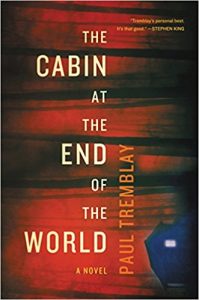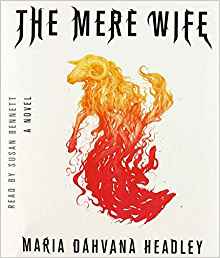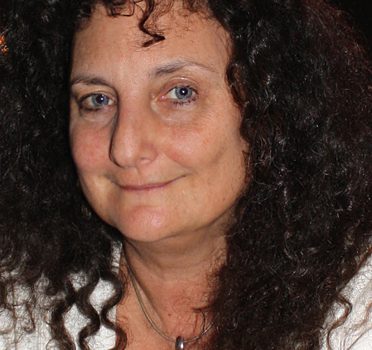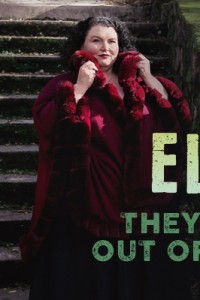Horror Round-Up 2018 by Ellen Datlow

As usual, I mostly read short horror fiction, but among the novels I read I found several good ones to recommend: Unbury Carol by Josh Malerman (Del Rey) is a weird, deeply dark western about the eponymous woman, who has suffered from a condition since childhood – she periodically falls into a deep coma-like state during which she appears dead. Only a few people know, and one – her husband – wants her dead and buried so he can inherit her wealth. So when she falls into one of her comas, it’s a race against time as her husband, her ex-lover, and a terrifying hired killer all converge on the town of Harrows. It’s gratifying to see Malerman move in a completely different direction with each new novel. A page-turner. Blood Standard by Laird Barron (Penguin) is Barron’s first crime novel, and while it’s not horror, per se, it is dark, violent, suspenseful, sharply etched, and very enjoyable. A former mob enforcer leaves Alaska (“or else”) for upstate New York, hoping to avoid criminal entanglements. No such luck, when his employers’ teenage granddaughter disappears after being seen with some unsavory characters.
 The Cabin at the End of the World by Paul Tremblay (Morrow) is about a home invasion committed for an unusual reason – by perpetrators who believe their actions will save the world. A male couple and their adopted daughter vacationing in a remote area in New Hampshire are the victims, and the perpetrators are a ragtag group with little in common but their so-called mission. Tense, claustrophobic, and suspenseful. The Anomaly by Michael Rutger (Grand Central Publishing) is a tour de force of suspense-horror about the crew of an X-Files-type reality web series given funding to search for a mysterious cavern in the Grand Canyon, supposedly discovered in 1909 by an explorer. Against all expectations, they actually find the cavern and in it a cave system. Things take a nasty turn. The suspense was such that at times I had to stop reading because I was afraid of what would happen next – especially because the author makes the reader feel for the characters. The twists and turns of the journey are matched by the twists and turns of the plot, creating an utterly satisfying read. I loved this one. The Hunger by Alma Katsu (Putnam) is about an historical event I could have sworn I never wanted to hear or read about again – the doomed wagon train to California known as the Donner Party. Yet Katsu makes it fresh with her vivid characterizations and her injection of supernatural terror. The Chalk Man by C.J. Tudor (Crown) is an absorbing, complex, dark crime debut that switches back and forth between 1986 and 2016, revolving around a group of five kids growing up in a tourist town in southern England. The book begins with a horrific accident at the fair, and quickly moves on to murder. Although there are some pretty unbelievable developments during the course of the novel, it’s still an enjoyable ride. I Am the River by T.E. Grau (Lethe Press) is a terrific novel that captures the horrors of the Vietnam war and how they follow one soldier back in visible form. Reminiscent of Lucius Shepard’s work. Ahab’s Return by Jeffrey Ford (Morrow) is a wonderful, dark confabulation which speculates that Ahab, having survived his final battle with the white whale, returns several years later to New York City to find his wife and son. A few other unexpected characters from Moby Dick show up, as does one unfortunate from a Dickens novel. There’s magic and dark sorcery involved, and opium. Dark fantasy with some nice, gruesome touches. The Mere Wife by Mariah Dahvana Headley (MCD) is a gorgeous contemporary retelling of Beowulf from the point of view of Grendel’s mother. An American soldier is seen to be beheaded on television yet apparently survives, returning from the desert pregnant and about to bear an unusual child. Is it horror? Probably not. But it’s dark and deep and a great read.
The Cabin at the End of the World by Paul Tremblay (Morrow) is about a home invasion committed for an unusual reason – by perpetrators who believe their actions will save the world. A male couple and their adopted daughter vacationing in a remote area in New Hampshire are the victims, and the perpetrators are a ragtag group with little in common but their so-called mission. Tense, claustrophobic, and suspenseful. The Anomaly by Michael Rutger (Grand Central Publishing) is a tour de force of suspense-horror about the crew of an X-Files-type reality web series given funding to search for a mysterious cavern in the Grand Canyon, supposedly discovered in 1909 by an explorer. Against all expectations, they actually find the cavern and in it a cave system. Things take a nasty turn. The suspense was such that at times I had to stop reading because I was afraid of what would happen next – especially because the author makes the reader feel for the characters. The twists and turns of the journey are matched by the twists and turns of the plot, creating an utterly satisfying read. I loved this one. The Hunger by Alma Katsu (Putnam) is about an historical event I could have sworn I never wanted to hear or read about again – the doomed wagon train to California known as the Donner Party. Yet Katsu makes it fresh with her vivid characterizations and her injection of supernatural terror. The Chalk Man by C.J. Tudor (Crown) is an absorbing, complex, dark crime debut that switches back and forth between 1986 and 2016, revolving around a group of five kids growing up in a tourist town in southern England. The book begins with a horrific accident at the fair, and quickly moves on to murder. Although there are some pretty unbelievable developments during the course of the novel, it’s still an enjoyable ride. I Am the River by T.E. Grau (Lethe Press) is a terrific novel that captures the horrors of the Vietnam war and how they follow one soldier back in visible form. Reminiscent of Lucius Shepard’s work. Ahab’s Return by Jeffrey Ford (Morrow) is a wonderful, dark confabulation which speculates that Ahab, having survived his final battle with the white whale, returns several years later to New York City to find his wife and son. A few other unexpected characters from Moby Dick show up, as does one unfortunate from a Dickens novel. There’s magic and dark sorcery involved, and opium. Dark fantasy with some nice, gruesome touches. The Mere Wife by Mariah Dahvana Headley (MCD) is a gorgeous contemporary retelling of Beowulf from the point of view of Grendel’s mother. An American soldier is seen to be beheaded on television yet apparently survives, returning from the desert pregnant and about to bear an unusual child. Is it horror? Probably not. But it’s dark and deep and a great read.
 The Book of M by Peng Shepherd (Morrow) is a fascinating, chilling, dystopian first novel. When one man in India loses his shadow, initially the world is intrigued. But when he begins to lose his memory, sliding into a premature dementia, and others around the world begin losing their shadows and memories, there is alarm, panic, and ultimately civilization is dismantled. There are several powerful threads, as groups of survivors learn to cope – or not. My Sister, the Serial Killer by Oyinkan Braithwaite (Doubleday) is told in first person by a Nigerian woman stuck cleaning up after her beautiful, charismatic, and deadly younger sister. This short, fast-paced novel grows on the reader, despite the shallowness of the young beauty who keeps killing off her boyfriends. This might be because the dynamics of the relationship of the two sisters slowly reveals itself to be deeper than one initially thinks.
The Book of M by Peng Shepherd (Morrow) is a fascinating, chilling, dystopian first novel. When one man in India loses his shadow, initially the world is intrigued. But when he begins to lose his memory, sliding into a premature dementia, and others around the world begin losing their shadows and memories, there is alarm, panic, and ultimately civilization is dismantled. There are several powerful threads, as groups of survivors learn to cope – or not. My Sister, the Serial Killer by Oyinkan Braithwaite (Doubleday) is told in first person by a Nigerian woman stuck cleaning up after her beautiful, charismatic, and deadly younger sister. This short, fast-paced novel grows on the reader, despite the shallowness of the young beauty who keeps killing off her boyfriends. This might be because the dynamics of the relationship of the two sisters slowly reveals itself to be deeper than one initially thinks.
 There were a number of notable collections published, including All the Fabulous Beasts by Priya Sharma (Undertow), the long overdue debut of this talented author’s work, featuring 16 stories published since 2006, two of them original. Sharma makes a graceful shift between the fantastic and horror genres, and many of her stories have been included in Best of the Year anthologies. Her novelette “Fabulous Beasts” was nominated for the Shirley Jackson Award and won the British Fantasy Award. Highly recommended. Guignol and Other Sardonic Tales by Orrin Grey (Word Horde) is this talented author’s third collection, and features 17 conte cruel (cruel stories), four published for the first time. With an introduction by the author. Spectral Evidence by Gemma Files (Trepidatio) is her fourth collection, this one bringing together nine stories originally published between 2006 and 2014. Spree and Other Stories by Lucy Taylor (Independent Regions) is Taylor’s sixth collection, and contains six stories and the novella of the title, all originally published between 1994 and 2014. Exploring Dark Short Fiction #2: A Primer to Kaaron Warren edited by Eric J. Guignard (Dark Moon Books) is the second volume in a new series inaugurated in 2017 by the publisher, intended to focus on literary horror writers of note. This one consists of six stories (one new) by Australian writer Warren, an author interview with her, a complete bibliography, and academic commentary by Michael Arnzen. Illustrated by Michelle Prebich. Figures Unseen: Selected Stories by Steve Rasnic Tem (Valancourt Books) brings together thirty-five of Tem’s favorite stories, originally published over a very productive career. It has an introduction by Simon Strantzas. The Ones Who Are Waving by Glen Hirshberg (Cemetery Dance) is the author’s fourth collection, and this one is more of a genre mix than his previous ones. The subtitle describes the stories very well. Most of the eight stories are at least tinged with darkness. One story is new. The Dummy & Other Uncanny Stories by Nicholas Royle (The Swan River Press) is the author’s third collection. The 18 stories (two new) reflect his evolution as a writer from 1994 to today. A few of the stories are more oblique than necessary, and he’s writing less and less horror than weird fiction, but at its best his work can still provide chills.
There were a number of notable collections published, including All the Fabulous Beasts by Priya Sharma (Undertow), the long overdue debut of this talented author’s work, featuring 16 stories published since 2006, two of them original. Sharma makes a graceful shift between the fantastic and horror genres, and many of her stories have been included in Best of the Year anthologies. Her novelette “Fabulous Beasts” was nominated for the Shirley Jackson Award and won the British Fantasy Award. Highly recommended. Guignol and Other Sardonic Tales by Orrin Grey (Word Horde) is this talented author’s third collection, and features 17 conte cruel (cruel stories), four published for the first time. With an introduction by the author. Spectral Evidence by Gemma Files (Trepidatio) is her fourth collection, this one bringing together nine stories originally published between 2006 and 2014. Spree and Other Stories by Lucy Taylor (Independent Regions) is Taylor’s sixth collection, and contains six stories and the novella of the title, all originally published between 1994 and 2014. Exploring Dark Short Fiction #2: A Primer to Kaaron Warren edited by Eric J. Guignard (Dark Moon Books) is the second volume in a new series inaugurated in 2017 by the publisher, intended to focus on literary horror writers of note. This one consists of six stories (one new) by Australian writer Warren, an author interview with her, a complete bibliography, and academic commentary by Michael Arnzen. Illustrated by Michelle Prebich. Figures Unseen: Selected Stories by Steve Rasnic Tem (Valancourt Books) brings together thirty-five of Tem’s favorite stories, originally published over a very productive career. It has an introduction by Simon Strantzas. The Ones Who Are Waving by Glen Hirshberg (Cemetery Dance) is the author’s fourth collection, and this one is more of a genre mix than his previous ones. The subtitle describes the stories very well. Most of the eight stories are at least tinged with darkness. One story is new. The Dummy & Other Uncanny Stories by Nicholas Royle (The Swan River Press) is the author’s third collection. The 18 stories (two new) reflect his evolution as a writer from 1994 to today. A few of the stories are more oblique than necessary, and he’s writing less and less horror than weird fiction, but at its best his work can still provide chills.
This and more like it in the February 2019 issue of Locus.
 While you are here, please take a moment to support Locus with a one-time or recurring donation. We rely on reader donations to keep the magazine and site going, and would like to keep the site paywall free, but WE NEED YOUR FINANCIAL SUPPORT to continue quality coverage of the science fiction and fantasy field.
While you are here, please take a moment to support Locus with a one-time or recurring donation. We rely on reader donations to keep the magazine and site going, and would like to keep the site paywall free, but WE NEED YOUR FINANCIAL SUPPORT to continue quality coverage of the science fiction and fantasy field.








